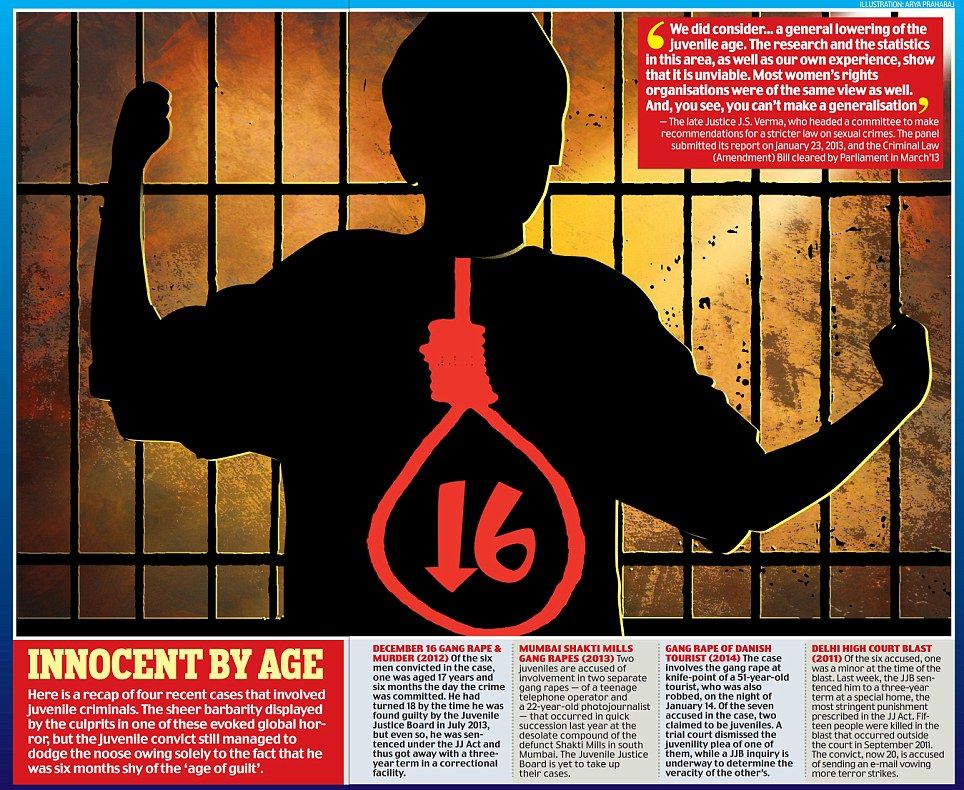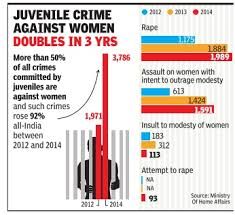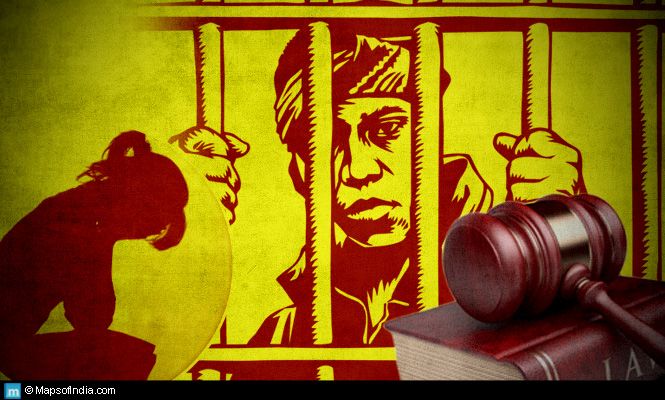Stop The Crime
Jan 31, 2019 • 60 views
JUVENILE CRIMES IN INDIA
“Juvenile crime is not naturally born in the boy, but is largely due either to the spirit of adventure that is in him, to his own stupidity, or to his lack of discipline, according to the nature of the individual.”
In the present article, we would try to understand who is a juvenile; crimes committed by juveniles; its reasons; laws and proposed changes by the Government in the same.
Children are considered to be gifts from God and are greatest personal and national assets. We as individuals, parents and society as a whole have a duty that children should be allowed and provided opportunity to grow up in a healthy socio-cultural environment so that they could become responsible citizens, physically fit, mentally alert and morally healthy. It is the duty of the State to provide equal opportunities for development to all children during the period of their growth which would reduce inequality and ensure social justice. Children are expected to be obedient, respectful and have virtues and good quality in them. However, due to various reasons certain percentage of children do not follow settled social and legal dictum. Such children are most often than not get involved in criminal behavior which is known as juvenile delinquency or juvenile crime.
Crime by juveniles is a harsh reality in India. In recent times juveniles were found to be involved in most heinous of the crimes such as gang rape and murder. Many experts believe that the present law is inadequate to deal with the situation and we need changes in it so that for heinous crimes juveniles may also be tried and punished as adults. But there are views in opposition as well which do not subscribe to this view.

WHO IS A JUVENILE?
Juvenile means a person who is very young, teenager, adolescent or underage. In terms of law, a juvenile is a person who has not attained the age of eighteen years. It has a legal significance. As per the Juvenile Justice (Care and Protection) Act, 2000, a juvenile shall not be treated as an adult even if he/she is involved in any criminal acts for the purpose of trial and punishment in the court of law.
DIFFERENCE BETWEEN A JUVENILE AND A MINOR
Though in common language we use both the terms interchangeably but ‘juvenile’ and ‘minor’ in legal terms are used in different context. The term juvenile is used with reference to a young criminal offender and the term minor relates to legal capacity or majority of a person.
JUVENILE CRIMES IN INDIA
Petty crimes in general and heinous crimes in particular are being committed regularly in India by children. Crimes such as theft, burglary, snatching which are not so serious in nature or crimes such as robbery, dacoit, murder and rape etc. which are relatively serious are on the rise in whole of the country. And the unfortunate thing is that all types of these crimes are also being committed by children below the age of 18 years.
Among juveniles also there is a specific trend that juveniles between the ages of 16 to 18 years are found to be more involved in heinous criminal acts. According to the National Crime Records Bureau, the data of 2013 shows that of the 43,506 crimes registered against minors under the Indian Penal Code (IPC) and the Special Local Law (SLL) by juveniles, 28,830 had been committed by those between the ages of 16 to 18. The statistics also show the number of juveniles found to be in conflict with law under the IPC and the SLL has risen 13.6% and 2.5% respectively in 2013, as compared with 2012.
The recent inhuman gang rape of a young girl on December 16, 2013, shocked the collective conscience of the nation. The brutality with which the heinous crime was committed was most shocking; it was later found out that among five accused, one was minor and he was the most barbaric one.
Again, in another brutal gang rape case which is known as Shakti Mill Rape case, a minor was involved. These and several more recent events have triggered a public debate that the present Juvenile Justice (Care and Protection) Act, 2000 which treats persons below the age of 18 years as minor or juvenile, should be amended.

REASONS FOR JUVENILE CRIMES
No one is a born criminal. Circumstances make him so. Socio-cultural environment, both inside and outside of home, plays significant role in shaping one’s life and overall personality.
Some of the most common causes which are associated with juvenile crimes are: There is no single cause for the development of delinquent behavior. According to Healy and Bronner, the causes of juvenile delinquency are:
(1) Bad company, (2) adolescent instability and impulses, (3) early sex experience, (4) mental conflicts, (5) extreme social suggestibility, (6) love of adventure, (7) motion picture, (8) school dissatisfaction, (9) poor recreation, (10) street life, (11) vocational dissatisfaction, (12) sudden impulse; and (13) physical conditions of all sorts.
However, as far as India is concerned, it is Poverty and the effect of media, especially the social-media which make juveniles more inclined towards criminal activities.
Poverty is one of the biggest causes which force a child to get involved in criminal acts. Also, role played by social media today which is having a more negative than positive imprints on young minds.
Others factors are also there which need greater study and analysis at a later time.
LAWS PASSED BY THE GOVERNMENT
The Juvenile Justice (Care and Protection of Children) Act, 2015 has been passed by Parliament of India. It aims to replace the existing Indian juvenile delinquency law, Juvenile Justice (Care and Protection of Children) Act, 2000, so that juveniles in conflict with Law in the age group of 16–18, involved in Heinous Offences, can be tried as adults. The Act came into force from 15 January 2016.
It was passed on 7 May 2015 by the Lok Sabha amid intense protest by several Members of Parliament. It was passed on 22 December 2015 by the Rajya Sabha.

SUMMARY
The bill will allow a Juvenile Justice Board, which would include psychologists and sociologists, to decide whether a juvenile criminal in the age group of 16–18 should tried as an adult or not. The bill introduced concepts from the Hague Convention on Protection of Children and Cooperation in Respect of Inter-Country Adoption, 1993 which were missing in the previous act. The bill also seeks to make the adoption process of orphaned, abandoned and surrendered children more streamlined.
The bill introduces foster care in India. Families will sign up for foster care and abandoned, orphaned children, or those in conflict with the law will be sent to them. Such families will be monitored and shall receive financial aid from the state. In adoption, disabled children and children of physically and financially incapable will be given priority. Parents giving up their child for adoption will get 3 months to reconsider, compared to the earlier provision of 1 month.
